Nicholas P. Cheremisinoff. Handbook of Solid Waste Management and Waste Minimization Technologies
Подождите немного. Документ загружается.

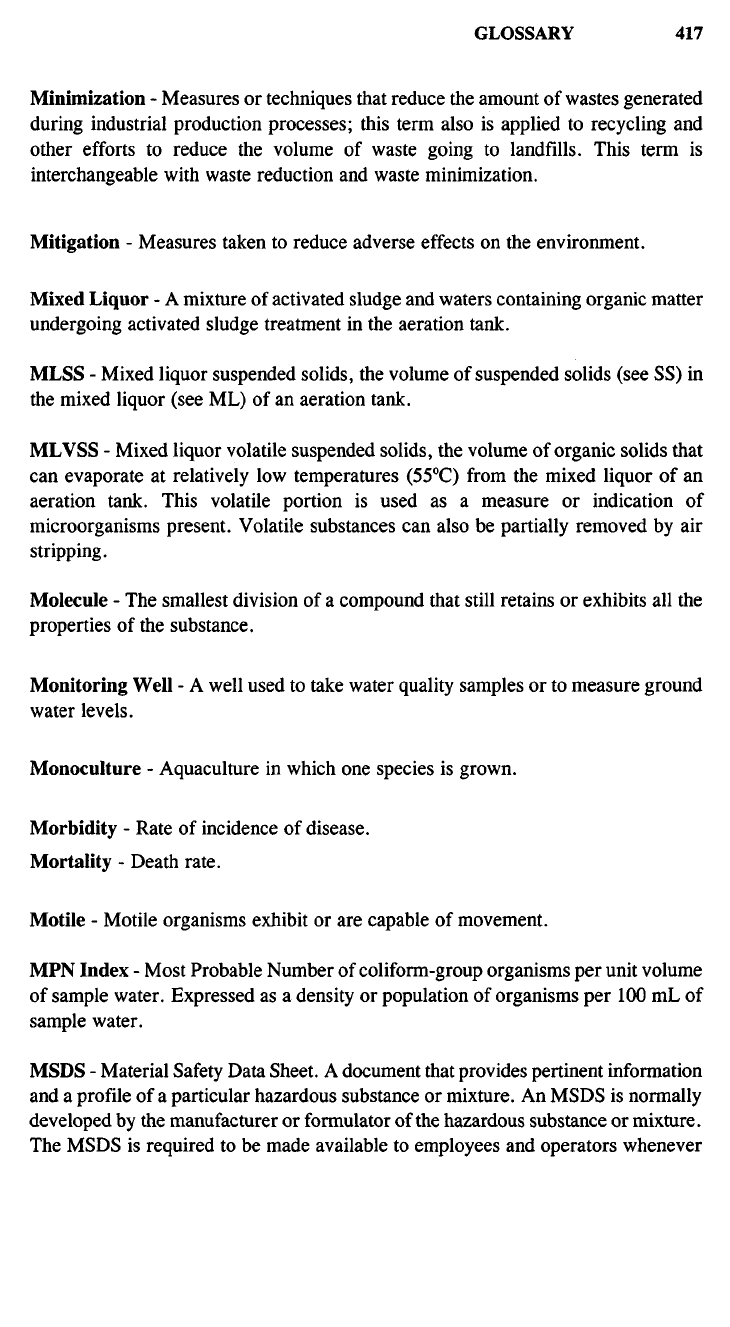
Minimization - Measures or techniques that reduce the amount of wastes generated
during industrial production processes; this term also is applied to recycling and
other efforts to reduce the volume of waste going to landfills. This term is
interchangeable with waste reduction and waste minimization.
Mitigation - Measures taken to reduce adverse effects on the environment.
Mixed Liquor - A mixture of activated sludge and waters containing organic matter
undergoing activated sludge treatment in the aeration tank.
MLSS - Mixed liquor suspended solids, the volume of suspended solids (see SS) in
the mixed liquor (see ML) of an aeration tank.
MLVSS - Mixed liquor volatile suspended solids, the volume of organic solids that
can evaporate at relatively low temperatures (55
0
C) from the mixed liquor of an
aeration tank. This volatile portion is used as a measure or indication of
microorganisms present. Volatile substances can also be partially removed by air
stripping.
Molecule - The smallest division of a compound that still retains or exhibits all the
properties of the substance.
Monitoring Well - A well used to take water quality samples or to measure ground
water levels.
Monoculture - Aquaculture in which one species is grown.
Morbidity - Rate of incidence of disease.
Mortality - Death rate.
Motile - Motile organisms exhibit or are capable of movement.
MPN Index - Most Probable Number of coliform-group organisms per unit volume
of sample water. Expressed as a density or population of organisms per 100 mL of
sample water.
MSDS - Material Safety Data Sheet. A document that provides pertinent information
and a profile of a particular hazardous substance or mixture. An MSDS is normally
developed by the manufacturer or formulator of the hazardous substance or mixture.
The MSDS is required to be made available to employees and operators whenever
Previous Page
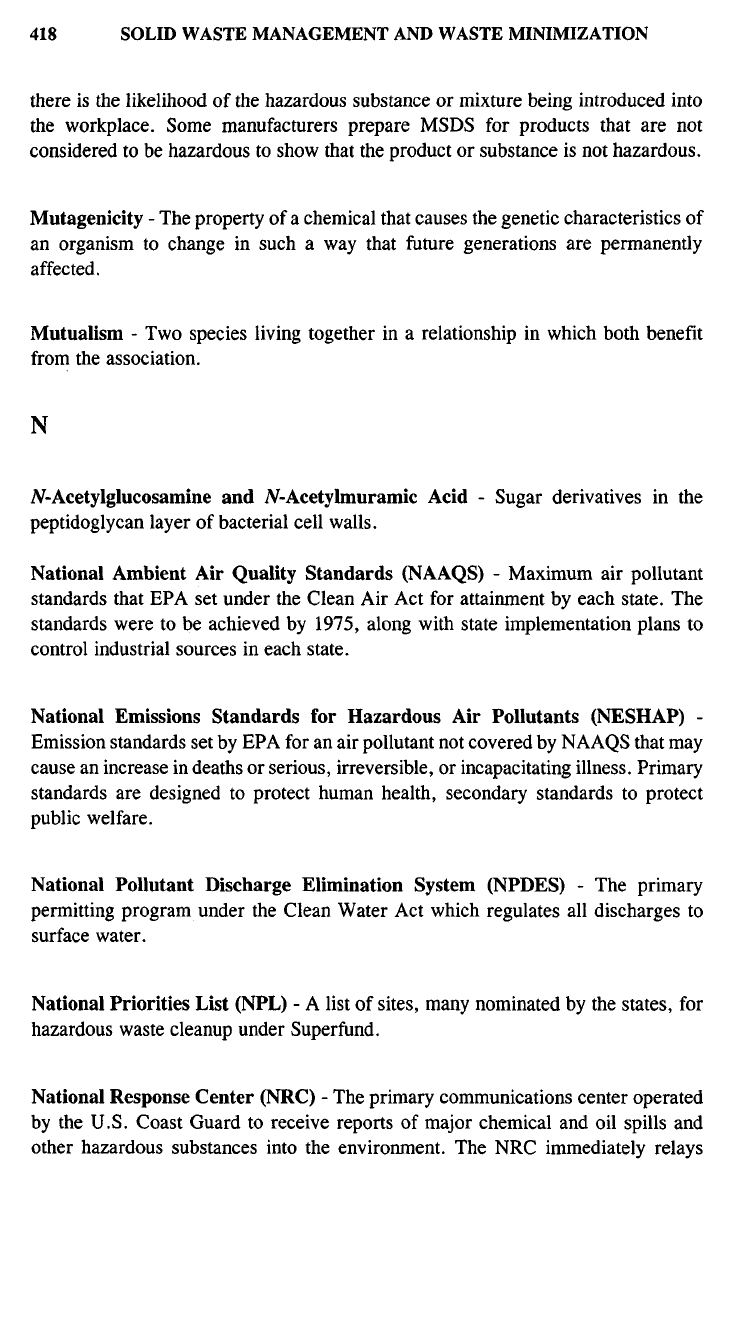
there is the likelihood of the hazardous substance or mixture being introduced into
the workplace. Some manufacturers prepare MSDS for products that are not
considered to be hazardous to show that the product or substance is not hazardous.
Mutagenicity - The property of a chemical that causes the genetic characteristics of
an organism to change in such a way that future generations are permanently
affected.
Mutualism - Two species living together in a relationship in which both benefit
from the association.
N
N-Acetylglucosamine and N-Acetylmuramic Acid - Sugar derivatives in the
peptidoglycan layer of bacterial cell walls.
National Ambient Air Quality Standards (NAAQS) - Maximum air pollutant
standards that EPA set under the Clean Air Act for attainment by each state. The
standards were to be achieved by 1975, along with state implementation plans to
control industrial sources in each state.
National Emissions Standards for Hazardous Air Pollutants (NESHAP) -
Emission standards set by EPA for an air pollutant not covered by NAAQS that may
cause an increase in deaths or serious, irreversible, or incapacitating illness. Primary
standards are designed to protect human health, secondary standards to protect
public welfare.
National Pollutant Discharge Elimination System (NPDES) - The primary
permitting program under the Clean Water Act which regulates all discharges to
surface water.
National Priorities List (NPL) - A list of sites, many nominated by the states, for
hazardous waste cleanup under Superfund.
National Response Center (NRC) - The primary communications center operated
by the U.S. Coast Guard to receive reports of major chemical and oil spills and
other hazardous substances into the environment. The NRC immediately relays
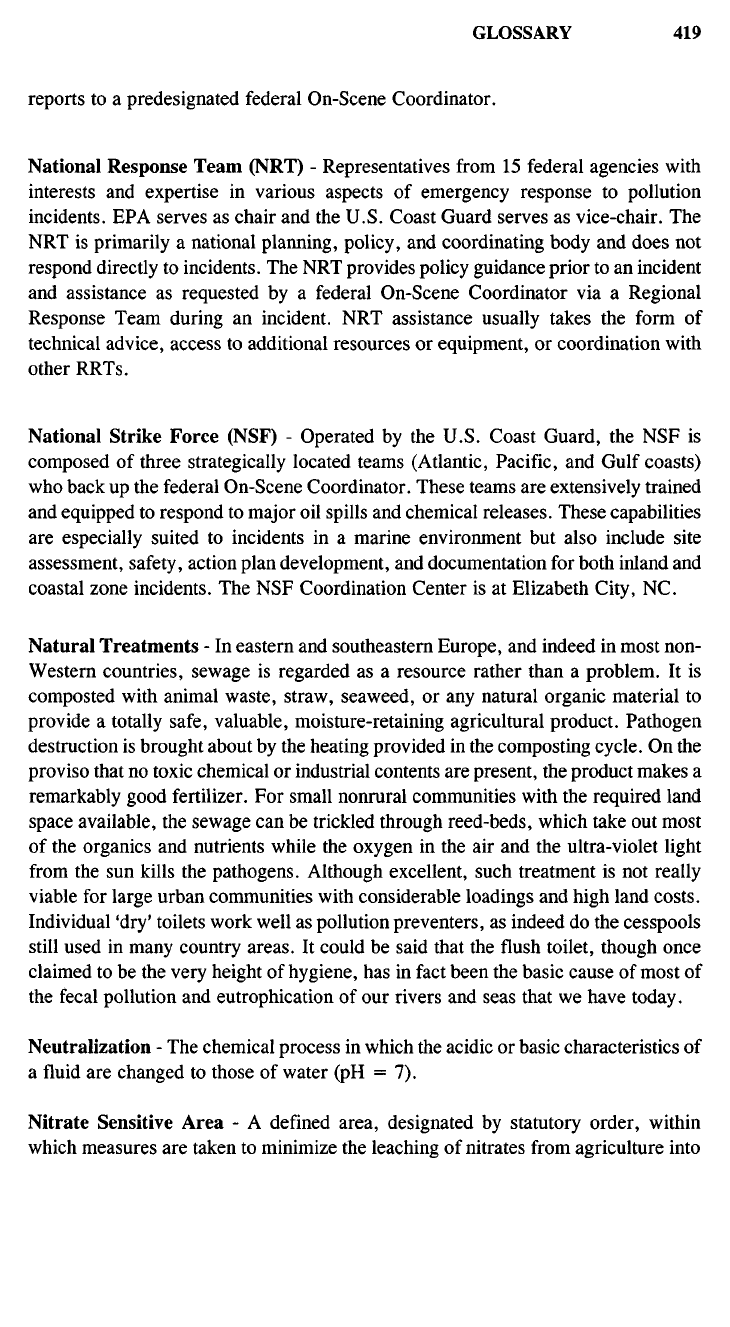
reports to a predesignated federal On-Scene Coordinator.
National Response Team (NRT) - Representatives from 15 federal agencies with
interests and expertise in various aspects of emergency response to pollution
incidents. EPA serves as chair and the U.S. Coast Guard serves as vice-chair. The
NRT is primarily a national planning, policy, and coordinating body and does not
respond directly to incidents. The NRT provides policy guidance prior to an incident
and assistance as requested by a federal On-Scene Coordinator via a Regional
Response Team during an incident. NRT assistance usually takes the form of
technical advice, access to additional resources or equipment, or coordination with
other RRTs.
National Strike Force (NSF) - Operated by the U.S. Coast Guard, the NSF is
composed of three strategically located teams (Atlantic, Pacific, and Gulf coasts)
who back up the federal On-Scene Coordinator. These teams are extensively trained
and equipped to respond to major oil spills and chemical releases. These capabilities
are especially suited to incidents in a marine environment but also include site
assessment, safety, action plan development, and documentation for both inland and
coastal zone incidents. The NSF Coordination Center is at Elizabeth City, NC.
Natural Treatments - In eastern and southeastern Europe, and indeed in most non-
Western countries, sewage is regarded as a resource rather than a problem. It is
composted with animal waste, straw, seaweed, or any natural organic material to
provide a totally safe, valuable, moisture-retaining agricultural product. Pathogen
destruction is brought about by the heating provided in the composting cycle. On the
proviso that no toxic chemical or industrial contents are present, the product makes a
remarkably good fertilizer. For small nonrural communities with the required land
space available, the sewage can be trickled through reed-beds, which take out most
of the organics and nutrients while the oxygen in the air and the ultra-violet light
from the sun kills the pathogens. Although excellent, such treatment is not really
viable for large urban communities with considerable loadings and high land costs.
Individual 'dry' toilets work well as pollution preventers, as indeed do the cesspools
still used in many country areas. It could be said that the flush toilet, though once
claimed to be the very height of hygiene, has in fact been the basic cause of most of
the fecal pollution and eutrophication of our rivers and seas that we have today.
Neutralization - The chemical process in which the acidic or basic characteristics of
a fluid are changed to those of water (pH = 7).
Nitrate Sensitive Area - A defined area, designated by statutory order, within
which measures are taken to minimize the leaching of nitrates from agriculture into
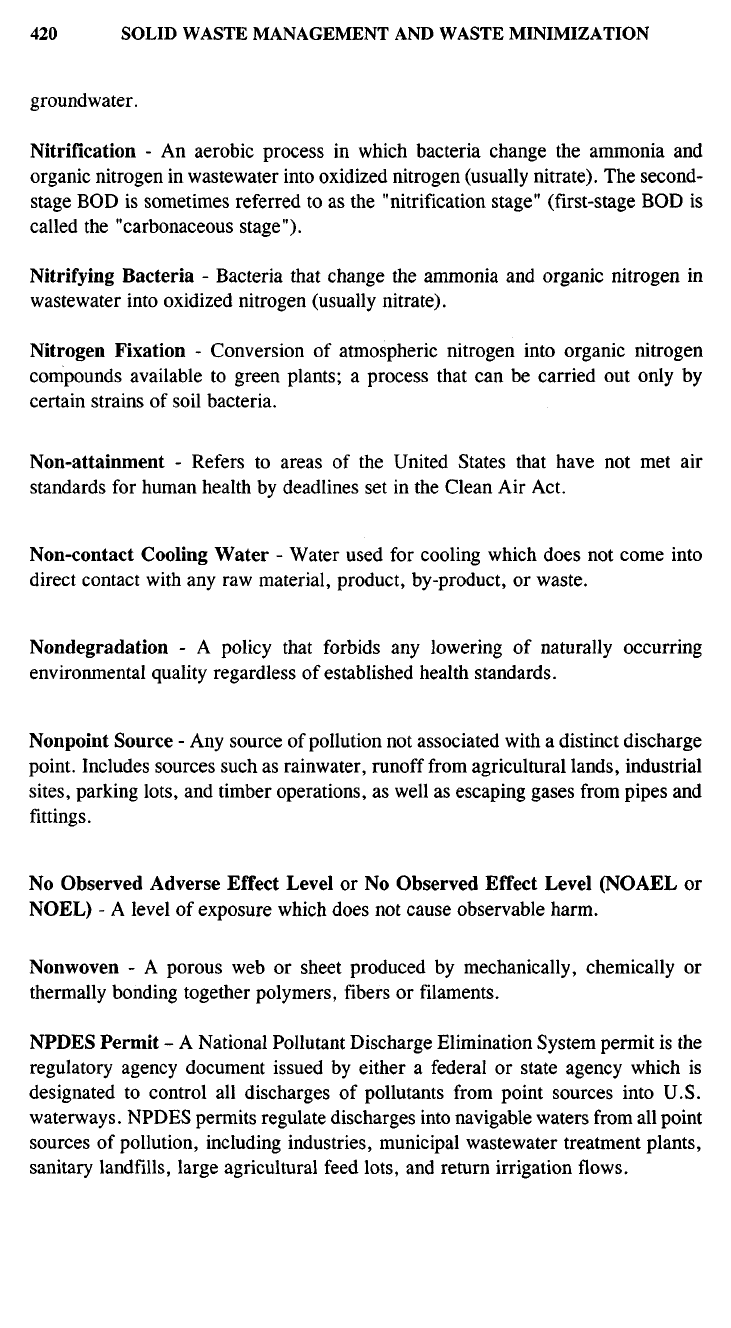
groundwater.
Nitrification - An aerobic process in which bacteria change the ammonia and
organic nitrogen in wastewater into oxidized nitrogen (usually nitrate). The second-
stage BOD is sometimes referred to as the "nitrification stage" (first-stage BOD is
called the "carbonaceous stage").
Nitrifying Bacteria - Bacteria that change the ammonia and organic nitrogen in
wastewater into oxidized nitrogen (usually nitrate).
Nitrogen Fixation - Conversion of atmospheric nitrogen into organic nitrogen
compounds available to green plants; a process that can be carried out only by
certain strains of soil bacteria.
Non-attainment - Refers to areas of the United States that have not met air
standards for human health by deadlines set in the Clean Air Act.
Non-contact Cooling Water - Water used for cooling which does not come into
direct contact with any raw material, product, by-product, or waste.
Nondegradation - A policy that forbids any lowering of naturally occurring
environmental quality regardless of established health standards.
Nonpoint Source - Any source of pollution not associated with a distinct discharge
point. Includes sources such as rainwater, runoff from agricultural lands, industrial
sites,
parking lots, and timber operations, as well as escaping gases from pipes and
fittings.
No Observed Adverse Effect Level or No Observed Effect Level (NOAEL or
NOEL) - A level of exposure which does not cause observable harm.
Nonwoven - A porous web or sheet produced by mechanically, chemically or
thermally bonding together polymers, fibers or filaments.
NPDES Permit - A National Pollutant Discharge Elimination System permit is the
regulatory agency document issued by either a federal or state agency which is
designated to control all discharges of pollutants from point sources into U.S.
waterways. NPDES permits regulate discharges into navigable waters from all point
sources of pollution, including industries, municipal wastewater treatment plants,
sanitary landfills, large agricultural feed lots, and return irrigation flows.
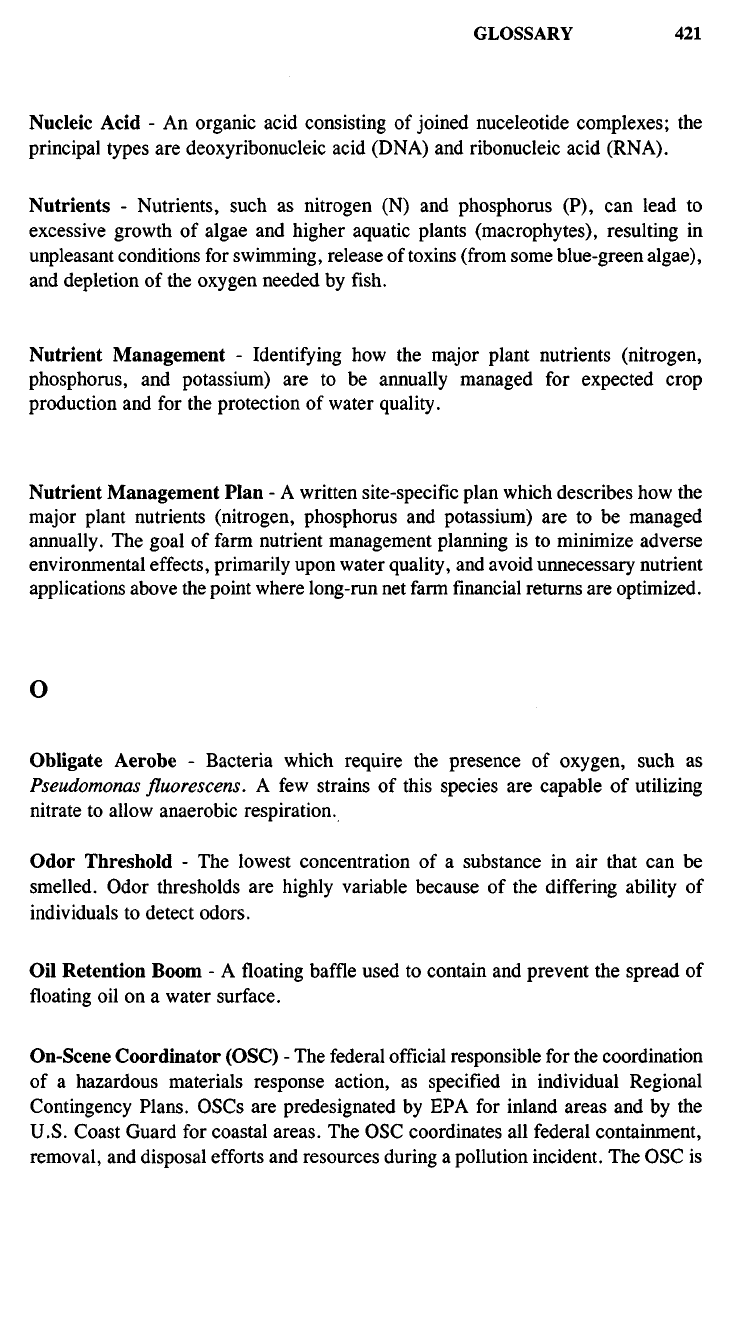
Nucleic Acid - An organic acid consisting of joined nuceleotide complexes; the
principal types are deoxyribonucleic acid (DNA) and ribonucleic acid (RNA).
Nutrients - Nutrients, such as nitrogen (N) and phosphorus (P), can lead to
excessive growth of algae and higher aquatic plants (macrophytes), resulting in
unpleasant conditions for swimming, release of toxins (from some blue-green algae),
and depletion of the oxygen needed by fish.
Nutrient Management - Identifying how the major plant nutrients (nitrogen,
phosphorus, and potassium) are to be annually managed for expected crop
production and for the protection of water quality.
Nutrient Management Plan - A written site-specific plan which describes how the
major plant nutrients (nitrogen, phosphorus and potassium) are to be managed
annually. The goal of farm nutrient management planning is to minimize adverse
environmental effects, primarily upon water quality, and avoid unnecessary nutrient
applications above the point where long-run net farm financial returns are optimized.
O
Obligate Aerobe - Bacteria which require the presence of oxygen, such as
Pseudomonas fluorescens. A few strains of this species are capable of utilizing
nitrate to allow anaerobic respiration.
Odor Threshold - The lowest concentration of a substance in air that can be
smelled. Odor thresholds are highly variable because of the differing ability of
individuals to detect odors.
Oil Retention Boom - A floating baffle used to contain and prevent the spread of
floating oil on a water surface.
On-Scene Coordinator (OSC) - The federal official responsible for the coordination
of a hazardous materials response action, as specified in individual Regional
Contingency Plans. OSCs are predesignated by EPA for inland areas and by the
U.S.
Coast Guard for coastal areas. The OSC coordinates all federal containment,
removal, and disposal efforts and resources during a pollution incident. The OSC is
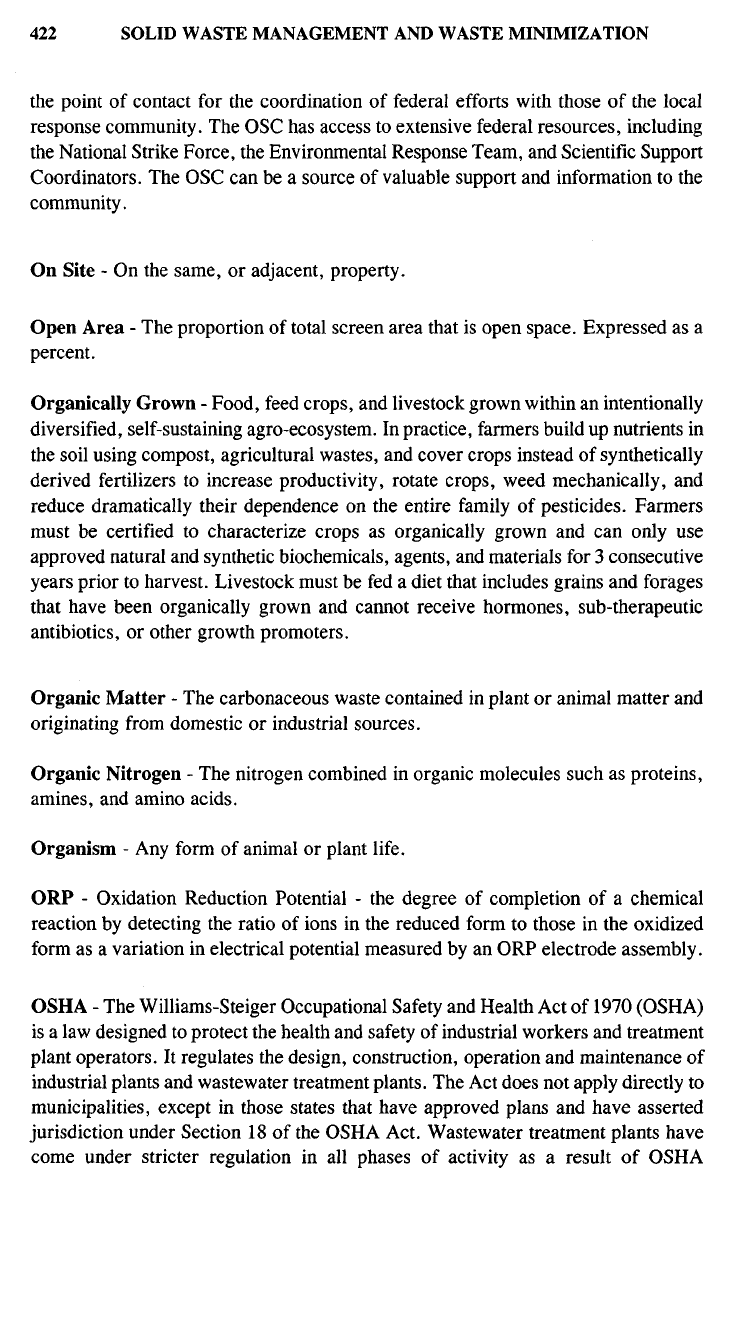
the point of contact for the coordination of federal efforts with those of the local
response community. The OSC has access to extensive federal resources, including
the National Strike Force, the Environmental Response Team, and Scientific Support
Coordinators. The OSC can be a source of valuable support and information to the
community.
On Site - On the same, or adjacent, property.
Open Area - The proportion of total screen area that is open space. Expressed as a
percent.
Organically Grown - Food, feed crops, and livestock grown within an intentionally
diversified, self-sustaining agro-ecosystem. In practice, farmers buildup nutrients in
the soil using compost, agricultural wastes, and cover crops instead of synthetically
derived fertilizers to increase productivity, rotate crops, weed mechanically, and
reduce dramatically their dependence on the entire family of pesticides. Farmers
must be certified to characterize crops as organically grown and can only use
approved natural and synthetic biochemicals, agents, and materials for 3 consecutive
years prior to harvest. Livestock must be fed a diet that includes grains and forages
that have been organically grown and cannot receive hormones, sub-therapeutic
antibiotics, or other growth promoters.
Organic Matter - The carbonaceous waste contained in plant or animal matter and
originating from domestic or industrial sources.
Organic Nitrogen - The nitrogen combined in organic molecules such as proteins,
amines, and amino acids.
Organism - Any form of animal or plant life.
ORP - Oxidation Reduction Potential - the degree of completion of a chemical
reaction by detecting the ratio of ions in the reduced form to those in the oxidized
form as a variation in electrical potential measured by an ORP electrode assembly.
OSHA - The Williams-Steiger Occupational Safety and Health Act of 1970 (OSHA)
is a law designed to protect the health and safety of industrial workers and treatment
plant operators. It regulates the design, construction, operation and maintenance of
industrial plants and wastewater treatment plants. The Act does not apply directly to
municipalities, except in those states that have approved plans and have asserted
jurisdiction under Section 18 of the OSHA Act. Wastewater treatment plants have
come under stricter regulation in all phases of activity as a result of OSHA
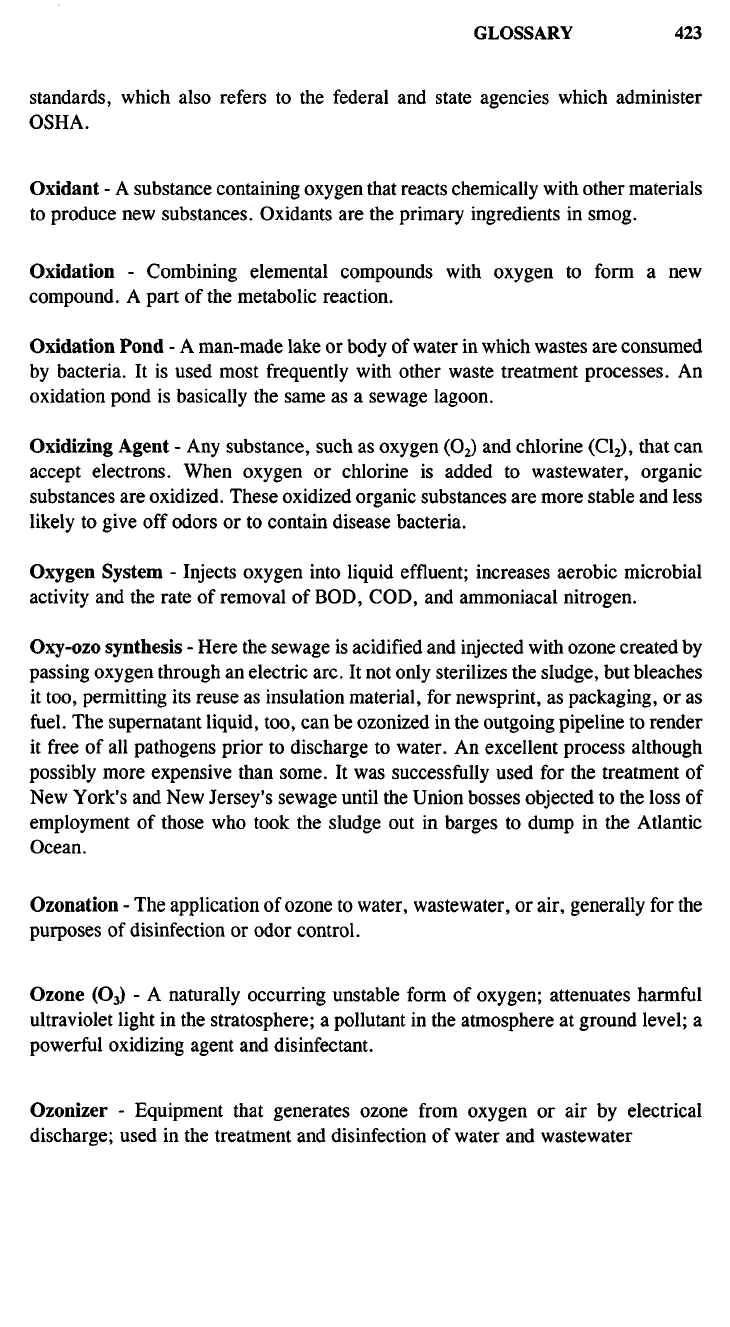
standards, which also refers to the federal and state agencies which administer
OSHA.
Oxidant - A substance containing oxygen that reacts chemically with other materials
to produce new substances. Oxidants are the primary ingredients in smog.
Oxidation - Combining elemental compounds with oxygen to form a new
compound. A part of the metabolic reaction.
Oxidation Pond - A man-made lake or body of water in which wastes are consumed
by bacteria. It is used most frequently with other waste treatment processes. An
oxidation pond is basically the same as a sewage lagoon.
Oxidizing Agent - Any substance, such as oxygen (O
2
) and chlorine (Cl
2
), that can
accept electrons. When oxygen or chlorine is added to wastewater, organic
substances are oxidized. These oxidized organic substances are more stable and less
likely to give off odors or to contain disease bacteria.
Oxygen System - Injects oxygen into liquid effluent; increases aerobic microbial
activity and the rate of removal of BOD, COD, and ammoniacal nitrogen.
Oxy-ozo synthesis - Here the sewage is acidified and injected with ozone created by
passing oxygen through an electric arc. It not only sterilizes the sludge, but bleaches
it too, permitting its reuse as insulation material, for newsprint, as packaging, or as
fuel. The supernatant liquid, too, can be ozonized in the outgoing pipeline to render
it free of all pathogens prior to discharge to water. An excellent process although
possibly more expensive than some. It was successfully used for the treatment of
New York's and New Jersey's sewage until the Union bosses objected to the loss of
employment of those who took the sludge out in barges to dump in the Atlantic
Ocean.
Ozonation - The application of ozone to water, wastewater, or air, generally for the
purposes of disinfection or odor control.
Ozone (O
3
) - A naturally occurring unstable form of oxygen; attenuates harmful
ultraviolet light in the stratosphere; a pollutant in the atmosphere at ground level; a
powerful oxidizing agent and disinfectant.
Ozonizer - Equipment that generates ozone from oxygen or air by electrical
discharge; used in the treatment and disinfection of water and wastewater
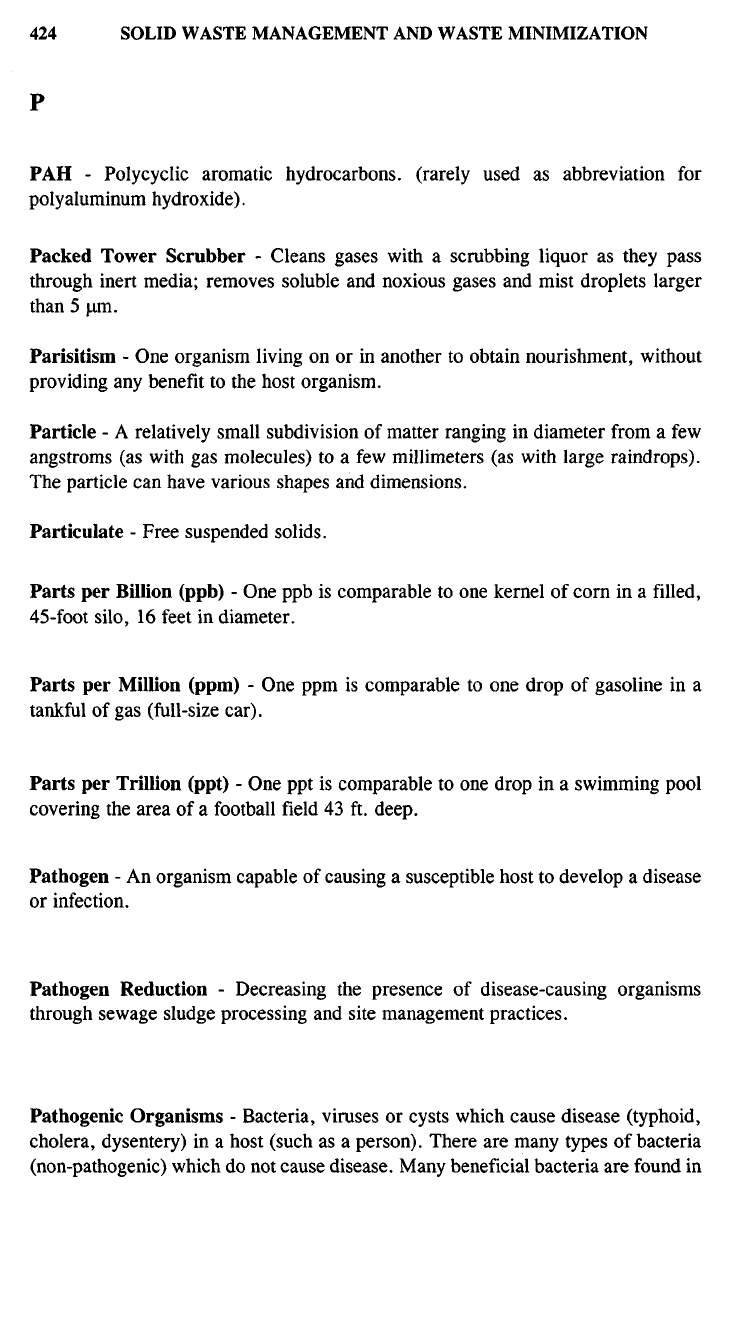
P
PAH - Poly cyclic aromatic hydrocarbons, (rarely used as abbreviation for
poly aluminum hydroxide).
Packed Tower Scrubber - Cleans gases with a scrubbing liquor as they pass
through inert media; removes soluble and noxious gases and mist droplets larger
than 5 jim.
Parisitism - One organism living on or in another to obtain nourishment, without
providing any benefit to the host organism.
Particle - A relatively small subdivision of matter ranging in diameter from a few
angstroms (as with gas molecules) to a few millimeters (as with large raindrops).
The particle can have various shapes and dimensions.
Particulate - Free suspended solids.
Parts per Billion (ppb) - One ppb is comparable to one kernel of corn in a filled,
45-foot silo, 16 feet in diameter.
Parts per Million (ppm) - One ppm is comparable to one drop of gasoline in a
tankful of gas (full-size car).
Parts per Trillion (ppt) - One ppt is comparable to one drop in a swimming pool
covering the area of a football field 43 ft. deep.
Pathogen - An organism capable of causing a susceptible host to develop a disease
or infection.
Pathogen Reduction - Decreasing the presence of disease-causing organisms
through sewage sludge processing and site management practices.
Pathogenic Organisms - Bacteria, viruses or cysts which cause disease (typhoid,
cholera, dysentery) in a host (such as a person). There are many types of bacteria
(non-pathogenic) which do not cause disease. Many beneficial bacteria are found in
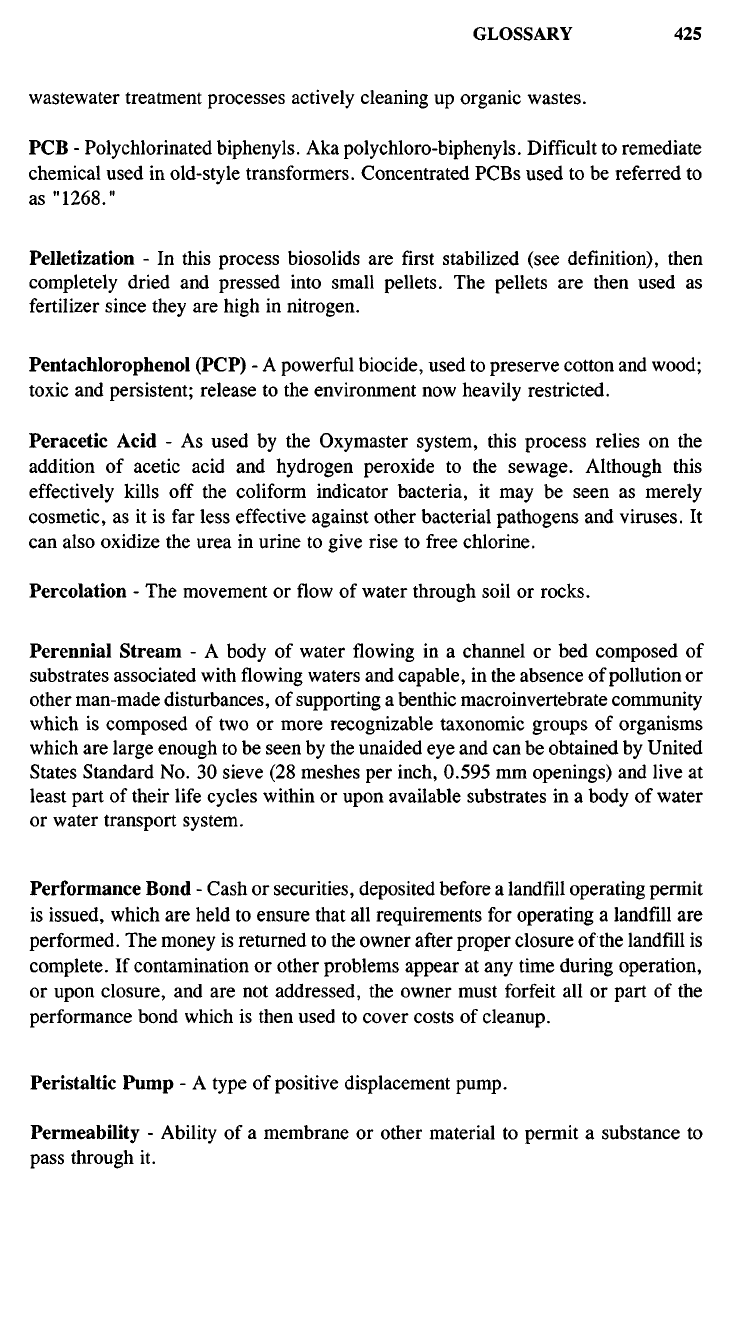
wastewater treatment processes actively cleaning up organic wastes.
PCB - Polychlorinated biphenyls. Aka polychloro-biphenyls. Difficult to remediate
chemical used in old-style transformers. Concentrated PCBs used to be referred to
as "1268."
Pelletization - In this process biosolids are first stabilized (see definition), then
completely dried and pressed into small pellets. The pellets are then used as
fertilizer since they are high in nitrogen.
Pentachlorophenol (PCP) - A powerful biocide, used to preserve cotton and wood;
toxic and persistent; release to the environment now heavily restricted.
Peracetic Acid - As used by the Oxymaster system, this process relies on the
addition of acetic acid and hydrogen peroxide to the sewage. Although this
effectively kills off the coliform indicator bacteria, it may be seen as merely
cosmetic, as it is far less effective against other bacterial pathogens and viruses. It
can also oxidize the urea in urine to give rise to free chlorine.
Percolation - The movement or flow of water through soil or rocks.
Perennial Stream - A body of water flowing in a channel or bed composed of
substrates associated with flowing waters and capable, in the absence of pollution or
other man-made disturbances, of supporting a benthic macroinvertebrate community
which is composed of two or more recognizable taxonomic groups of organisms
which are large enough to be seen by the unaided eye and can be obtained by United
States Standard No. 30 sieve (28 meshes per inch, 0.595 mm openings) and live at
least part of their life cycles within or upon available substrates in a body of water
or water transport system.
Performance Bond - Cash or securities, deposited before a landfill operating permit
is issued, which are held to ensure that all requirements for operating a landfill are
performed. The money is returned to the owner after proper closure of the landfill is
complete. If contamination or other problems appear at any time during operation,
or upon closure, and are not addressed, the owner must forfeit all or part of the
performance bond which is then used to cover costs of cleanup.
Peristaltic Pump - A type of positive displacement pump.
Permeability - Ability of a membrane or other material to permit a substance to
pass through it.
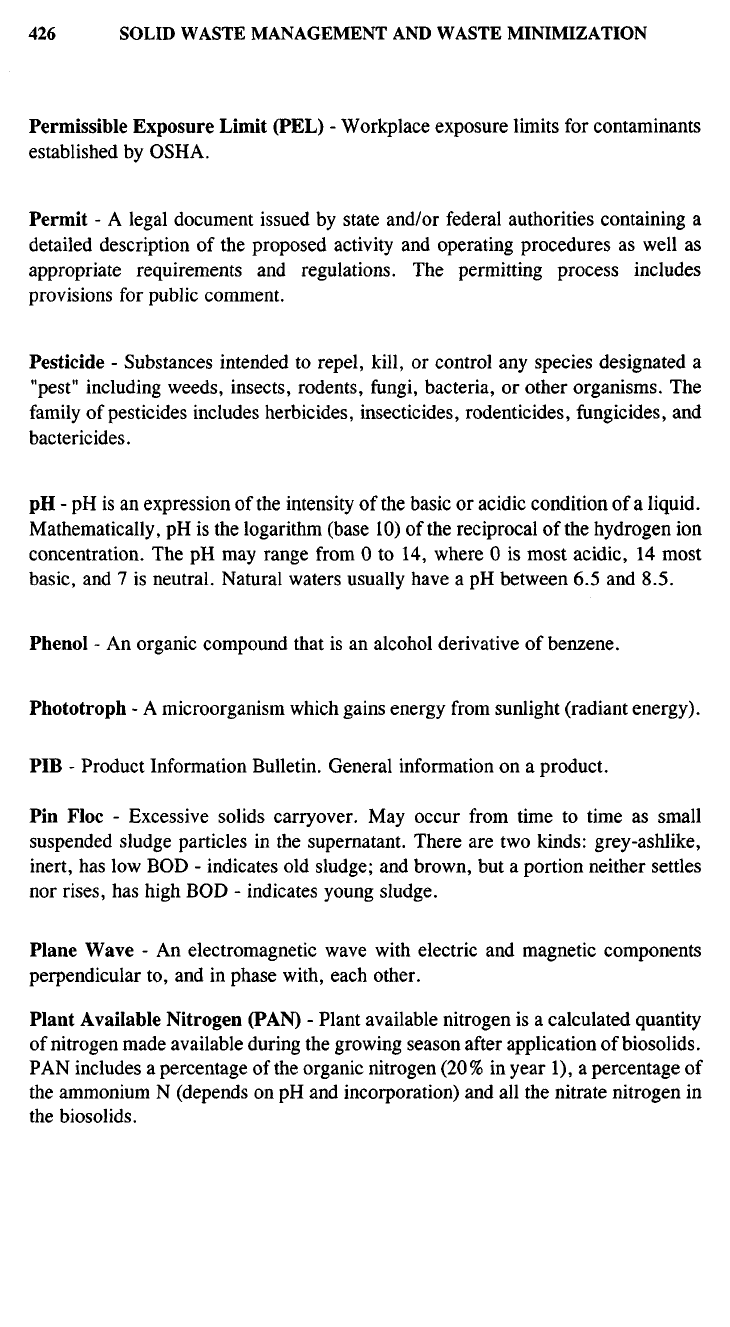
Permissible Exposure Limit (PEL) - Workplace exposure limits for contaminants
established by OSHA.
Permit - A legal document issued by state and/or federal authorities containing a
detailed description of the proposed activity and operating procedures as well as
appropriate requirements and regulations. The permitting process includes
provisions for public comment.
Pesticide - Substances intended to repel, kill, or control any species designated a
"pest" including weeds, insects, rodents, fungi, bacteria, or other organisms. The
family of pesticides includes herbicides, insecticides, rodenticides, fungicides, and
bactericides.
pH - pH is an expression of the intensity of the basic or acidic condition of a liquid.
Mathematically, pH is the logarithm (base 10) of the reciprocal of the hydrogen ion
concentration. The pH may range from 0 to 14, where 0 is most acidic, 14 most
basic,
and 7 is neutral. Natural waters usually have a pH between 6.5 and 8.5.
Phenol - An organic compound that is an alcohol derivative of benzene.
Phototroph - A microorganism which gains energy from sunlight (radiant energy).
PIB - Product Information Bulletin. General information on a product.
Pin Floe - Excessive solids carryover. May occur from time to time as small
suspended sludge particles in the supernatant. There are two kinds: grey-ashlike,
inert, has low BOD - indicates old sludge; and brown, but a portion neither settles
nor rises, has high BOD - indicates young sludge.
Plane Wave - An electromagnetic wave with electric and magnetic components
perpendicular to, and in phase with, each other.
Plant Available Nitrogen (PAN) - Plant available nitrogen is a calculated quantity
of nitrogen made available during the growing season after application of biosolids.
PAN includes a percentage of the organic nitrogen (20% in year 1), a percentage of
the ammonium N (depends on pH and incorporation) and all the nitrate nitrogen in
the biosolids.
